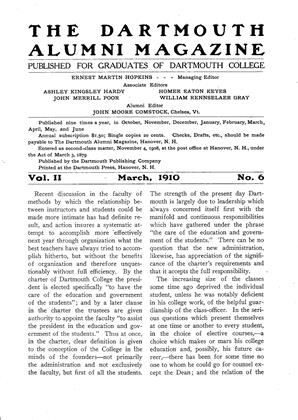CIVIC SERVICE ON THE PART OF COLLEGE FACULTY MEMBERS IN SMALL TOWNS
March, 1910 ROBERT FLETCHERIn the Engineering News of March 3 there is published the following letter, interesting to Dartmouth men:
SIR: An editorial note in your issue of Feb. 3, 1910, drew deserved attention to the responsibility of members of faculties of colleges to take an acetive interest in matters affecting the public welfare. You surmise truly that the faculty of Dartmouth College has not failed in that respect, but it may add point to your remarks to specify some of the public services rendered by college men here.
A professor of civil engineering has served as Chairman of the Board of Precinct Commissioners about fifteen years, having charge of highway improvements and construction of macadam roads. This office includes duty as health officer. A professor of mathematics has served many years as Justice of the Police Court, and one term in the state legislature. A number of professors in various departments, and the wife of one professor, have served terms of ten or more years as members of the School Board. A professor of chemistry has been presiding officer at town meetings during several years. Another professor of civil engineering has been Engineer and President of the Water-Works Co., a semipublic corporation, more than fifteen years; also member of the State Board of Health for about the same period.
A member of the faculty of the medical college has the widest sphere of activity. As medical director of the college he has oversight of the sanitary condition of seventeen dormitories, all of the eating clubs and the "commons"; makes frequent inspections and tests of food supplies; checks epidemics of influenza by prompt fumigation of recitation rooms and affected dormitories; usually has personal knowledge of any serious illness among more than a thousand students; makes frequent observations and tests of the bacteriological and other conditions of the water in the large storage reservoir which supplies both the college and the town; and, as bacteriologist of the State Board of Health, has the resources of the laboratory and expert knowledge at command for the benefit of the community. His prompt recognition and treatment of first cases has, without doubt, averted local epidemics of contagious diseases.
A large part of these various services are rendered either gratuitously, or for small pay in no wise commensurate with their value to the public. And why not? True public spirit cannot be measured by a dollar standard. John Smeaton, the first English "civil engineer," only gave expression to a sentiment exemplified in many lands by true men of every age when he put forth the maxim: "The abilities of the individual are a debt which he owes to the common stock of the public happiness." College men, above most others, have exceptional opportunities for gaining knowledge and culture. If they would escape the reproach of possessing only "ineffective culture," which is sometimes thrown at them, let them find some way to discharge loyally their obligation to serve their fellow men and "lend a hand" where it is needed.
Respectfully yours,
Director Thayer School Civil Engineering.
Hanover, N. H., Feb. 11, 1910.
 View Full Issue
View Full Issue
More From This Issue
-
 Article
ArticleTHE CRITICAL PERIOD FOR THE AMERICAN COLLEGE
March 1910 By Ernest M. Hopkins '01 -
 Article
ArticleRecent discussion in the faculty of methods
March 1910 -
 Class Notes
Class NotesLOCAL ASSOCIATIONS
March 1910 -
 Article
ArticleBASKETBALL
March 1910 -
 Class Notes
Class NotesCLASS OF 1899
March 1910 By Charles H. Donahue -
 Article
ArticleCOLLEGE NOTES
March 1910
ROBERT FLETCHER
-
 Letters to the Editor
Letters to the EditorLETTERS TO THE EDITOR
January 1935 -
 Class Notes
Class NotesMEETING OF THE THAYER SOCIETY OF ENGINEERS.
FEBRUARY 1906 By Charles H. Nichols, ROBERT FLETCHER -
 Article
ArticleTHAYER SCHOOL OF CIVIL ENGINEERING
August, 1911 By Robert Fletcher -
 Article
ArticleTHE THAYER SCHOOL OF CIVIL ENGINEERING
February, 1912 By Robert Fletcher -
 Article
ArticleTHAYER SCHOOL OF CIVIL ENGINEERING
August, 1914 By Robert Fletcher -
 Article
ArticleWILLIAM HOOD '67 Chief Engineer of the Southern Pacific Railroad Lines
March 1919 By Robert Fletcher







